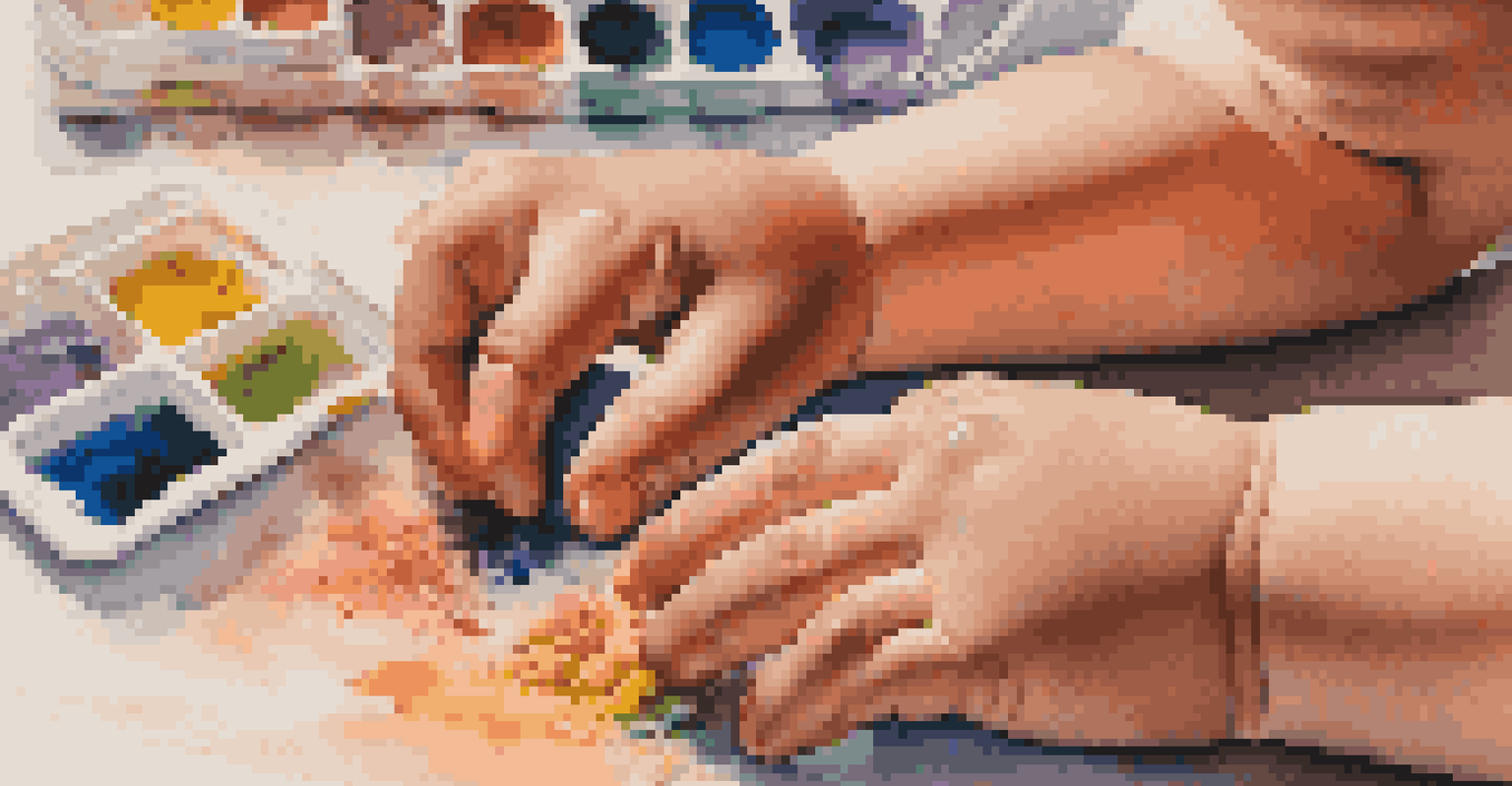The Importance of Creativity in Kids' Health

Creativity as a Vital Component of Child Development
Creativity is more than just making art; it's a fundamental aspect of child development. When children engage in creative activities, they stimulate their brains in ways that promote cognitive growth. This type of engagement fosters problem-solving skills and critical thinking, which are crucial for navigating the world around them.
Creativity is intelligence having fun.
Additionally, creativity encourages emotional expression. Kids often have complex feelings they may not fully understand, and creative outlets like drawing or storytelling can help them articulate those emotions. This not only aids in their emotional development but also provides a sense of control and self-awareness.
Finally, creativity can lead to increased resilience. When children create, they often face challenges and learn to overcome them, building their confidence. This resilience is essential for their mental health, helping them cope with life’s ups and downs.
The Role of Play in Fostering Creativity
Play is a natural way for children to explore their creativity. Whether it’s through imaginative games or building with blocks, play allows kids to experiment without fear of failure. This freedom encourages them to think outside the box, which is a critical aspect of creative thinking.

Moreover, play often involves collaboration with peers, enhancing social skills. Kids learn to share ideas, negotiate roles, and work together towards a common goal. These interactions not only boost their creative thinking but also contribute to their emotional and social development.
Creativity Fuels Child Development
Engaging in creative activities enhances cognitive growth, emotional expression, and resilience in children.
In essence, play acts as a safe space where children can express their creativity. This unstructured time is essential, as it allows them to discover their interests and develop a sense of identity, which is crucial for their overall health.
Creativity and Mental Health: A Vital Connection
Engaging in creative activities can significantly improve children's mental health. Activities like drawing, music, or dance provide an outlet for stress and anxiety, allowing kids to process their feelings in a healthy way. This can be particularly beneficial during challenging times, such as family changes or school stress.
Every child is an artist. The problem is how to remain an artist once we grow up.
Research shows that children who regularly participate in creative endeavors report higher levels of happiness and lower levels of depression. This is likely due to the sense of achievement and self-expression that comes from creating something unique. It reinforces their self-esteem and encourages a positive self-image.
Incorporating creativity into daily routines can also promote mindfulness. When children focus on the act of creating, they become immersed in the moment, which can help reduce negative thought patterns and promote emotional well-being.
Enhancing Cognitive Skills Through Creative Activities
Creativity is closely linked to cognitive development in children. Activities that encourage creative thinking, such as puzzles, storytelling, and role-playing, stimulate various brain functions. These activities not only enhance memory and concentration but also improve logical reasoning and analytical skills.
For example, when children engage in storytelling, they must remember details, understand sequences, and anticipate outcomes. This multifaceted engagement helps strengthen their cognitive abilities, equipping them with essential skills for academic success.
Play Sparks Creative Exploration
Unstructured play allows children to experiment, collaborate, and express their creativity in a safe environment.
Furthermore, creativity encourages divergent thinking, which is the ability to generate multiple solutions to a problem. This skill is invaluable in today's rapidly changing world, where adaptability and innovation are key.
The Importance of Artistic Expression in Health
Artistic expression is a powerful form of creativity that can significantly impact children's health. Engaging in activities like painting, sculpting, or music can serve as a therapeutic outlet for kids. This type of expression allows them to communicate feelings and experiences that they might struggle to articulate verbally.
Moreover, creating art can lead to a state of flow, where children lose track of time and feel fully absorbed in their activity. This mental state is associated with reduced stress and increased happiness, contributing to better overall health.
In addition, art can foster a sense of community. When children share their creations with others, it builds connections and social bonds, further enhancing their emotional well-being.
Integrating Creativity into Daily Life
Incorporating creativity into everyday activities can be simple and rewarding. Parents can encourage creative play by providing materials like crayons, clay, or musical instruments. Even everyday tasks, like cooking or gardening, can become avenues for creative exploration.
Moreover, setting aside dedicated time for creative pursuits can help children prioritize these activities. Whether it’s a weekly art night or a family dance party, these moments can strengthen family bonds while promoting creativity.
Art Promotes Mental Well-Being
Creative activities like art provide therapeutic outlets for children, improving their mental health and emotional resilience.
Finally, fostering a creative environment at home encourages children to express themselves freely. This supportive atmosphere can boost their confidence and inspire a lifelong love for creative endeavors.
Encouraging a Lifelong Appreciation for Creativity
Cultivating a love for creativity in childhood can lead to lifelong benefits. When children are encouraged to explore their creative interests, they develop a passion that can carry into adulthood. This appreciation for creativity can manifest in various ways, enhancing their personal and professional lives.
Additionally, fostering creativity can lead to a more innovative mindset. In a world that increasingly values creativity and innovation, individuals who can think creatively will have distinct advantages in their careers and personal endeavors.

Ultimately, supporting children's creativity is an investment in their future health and happiness. By nurturing these skills early on, we equip them with the tools they need to thrive in an ever-evolving world.